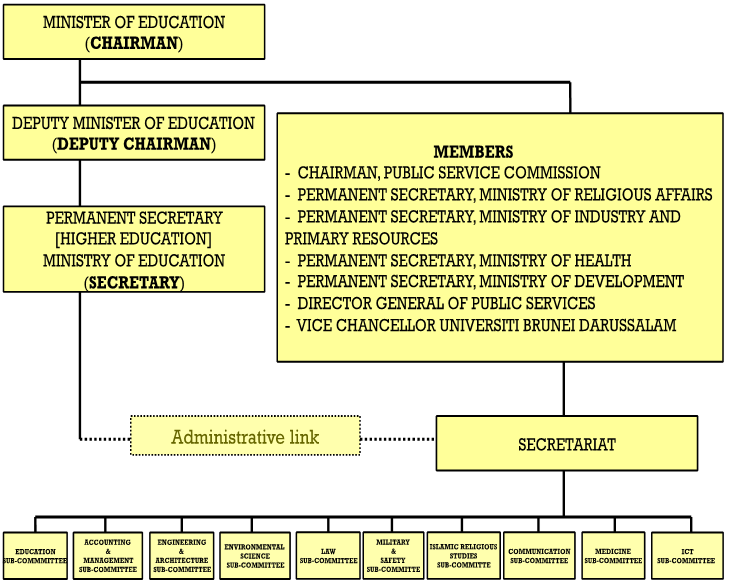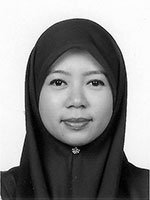Abstract
With greater socio-economic cooperation and integration in South-East Asia, mechanisms for fair and transparent recognition of qualifications are needed to facilitate learning and labour mobility. This need is recognised by the Government of Brunei Darussalam which has transformed the technical and vocational education and training in the country in response to the national and regional developments. This article explores the main characteristics of TVET in Brunei and quality assurance mechanisms currently in place in the qualification process in TVET, based on desk research, document analyses and interviews with key stakeholders. It also identifies strengths, key issues and areas of improvement in the current systems and provides suggestions for further developing effective and efficient quality assurance system for TVET qualifications in Brunei.
Keywords: Brunei Darussalam, Quality Assurance, Qualification Process, Policy, TVET
1 Introduction
Following a recommendation made in the 3rd International Congress on Technical and Vocational Education and Training (TVET) held in Shanghai in 2012, UNESCO had launched a global research with its main aim “to work together to produce guidelines for better quality assurance of TVET qualifications”. This country report will be the major source of data for Brunei Darussalam, to be used to develop the comparative analysis, and as key source of evidence for other countries to understand the different approaches to quality assurance of TVET qualification in Brunei. This report aims to: (1) Describe the main characteristics of TVET in Brunei; (2) Review the quality assurance currently being applied to the TVET qualification process in Brunei; and (3) Identify the potential and challenges of implementing effective and efficient quality assurance of TVET qualifications in Brunei.
In order to reach the above-mentioned objectives, Research and Statistics Division (RSD), under Institute of Brunei Technical Education (IBTE), Ministry of Education (MOE), Brunei, was appointed as the internal working group to conduct the country research, through document analyses and a series of in-depth interviews and a focus group interview with the key stakeholders involved in quality assurance of qualification in Brunei.
2 General overview of the TVET system in Brunei
In 2007, the Compulsory Education Order 2007 was enacted that mandates Bruneian children residing in the country to receive formal education for at least nine years; composing of a year in pre-school, 6 years in primary education and 2 years in lower secondary (MOE-SPN21 n.d.).
The need to continue fine-tuning the education system to ensure that students are equipped with the relevant knowledge, skills, values and attitudes called for in the 21st century led to the introduction of the “National Education System for the 21st Century” or “Sistem Pendidikan Negara Abad ke-21” (SPN21) in Brunei Darussalam in 2009. This system brought about three main changes: The Education Structure; Curriculum and Assessment; and Technical Education. Before 2009, all students were required to sit for the GCE ‘O’ Level Examination at the end of Year 11. However, with SPN21, MOE has implemented a new programme, Pearson BTEC, to cater for non-academically inclined students at the upper secondary level. Students in this programme will take up mostly technology-oriented and business-oriented subject combinations that adopt a more practical and hands-on teaching and learning approaches.
In 2013, with the introduction of IBTE White Paper, TVET in Brunei Darussalam underwent a major transformation by restructuring the technical education as a statutory board, autonomous post-secondary institution known as Institute of Brunei Technical Education (IBTE). The previous TVET system which is under the Department of Technical Education (DTE), a Government Department, is already out of phase and not likely able to respond to the needs in a modern and globally competitive society. The transformation of Brunei Technical Education ensures multiple pathways with clear progression opportunities for our students in an effort to produce highly skilled human resources to support the nation’s economic development (IBTE, n.d.). This process is in response to the titah made by His Majesty the Sultan and Yang Di-Pertuan Negara Brunei Darussalam in welcoming the new year 2013, urging for a re-evaluation of the technical and vocational education, in the hopes of contributing to the needs of the industry and local job market. The new TVET system is expected to stay relevant so that in the long run, the system can help to overcome the many challenges that TVET institutions are facing and bring about a change in mind-set about vocational training in the society.
Presently, TVET is embedded as part of the formal education system through two levels: Secondary and Post-secondary (Table 1). At secondary level, students are able to acquire basic technical and vocational skills only by joining the Applied Programme stream (BTEC). Meanwhile, Institute of Brunei Technical Education (IBTE) and Politeknik Brunei (PB) are the two major providers TVET at post-secondary level.
3 Evolution and governance of quality assurance in TVET in Brunei
The current national legislation that governs quality assurance is the Brunei Darussalam National Accreditation Council (BDNAC) Order 2011 (BDNAC 2011). The BDNAC was established in 1990, as a sole accrediting body in Brunei Darussalam responsible on all matters related to the assessment and accreditation of qualifications recognised by the Government of His Majesty the Sultan and Yang Di-Pertuan of Brunei Darussalam (MOE-BDQF 2014). There are also two other agencies that are responsible for quality assurance of certification in Brunei, namely Brunei Darussalam Technical and Vocational Education Council (BDTVEC) and Private Education Section (BPS).
All these three agencies are placed under Ministry of Education (MOE). BDTVEC was established in May 1991, to be the national awarding body for vocational and technical qualifications in Brunei, while BPS is in charge of registration, regulating and monitoring all private educational institutions (formal and non-formal) in Brunei.
3.1 Brunei Darussalam National Accreditation Agency (BDNAC)
BDNAC lists all of the approved programmes and qualifications on its website, with their levels and purposes as a point of reference and value-added information for learners and employers. Initially, the main purpose of accreditation is for recruitment in the public sector. Recently, however, more and more of the private sectors also wanted their future employees to have a qualification that is accredited by BDNAC. Accreditation is also important for considering the awarding of government scholarships and in-service training for the students or working individuals respectively.
As a result, members of the Council would mostly be made up of high-level officials in the Government (Figure 1), chaired by the Minister of Education himself. The Council is assisted by ten sub-committees, whose responsibility is to assess and evaluate qualifications and to make recommendations to the Council. The Council is backed by the Secretariat which is headed by the Executive Secretary.
 Figure 1: Organizational chart of Brunei Darussalam National Accreditation Agency (BDNAC)
Figure 1: Organizational chart of Brunei Darussalam National Accreditation Agency (BDNAC)
In its assessment of accreditation, BDNAC cross-references and obtains its up-to-date and first-hand information from various sources published by international accreditation agencies such as Tertiary Education Quality Standards Agency (Australia), Malaysian Qualifications Authority (Malaysia), New Zealand Qualifications Authority (New Zealand) and Quality Assurance Agency for Higher Education (United Kingdom). BNAC has also become an intermediate member of Asia Pacific Quality Network and has participated in international seminars that discuss the issue of quality assurance, best practices and accreditation. The BDNAC continuously reviews its policies to keep them up-to-date as well as to be in line with the goal of the Ministry of Education to promote life-long learning.
Table 1: General overview of TVET system in Brunei
| Type of programme |
Who are the major providers of this type of programme? |
What is the typical duration and how prevalent is this type of programme? | What are the skill levels (low, intermediate, high) of the occupation that this type of programme covers? | What is the balance between practical work, technical training and general education in this programme? | Who is responsible for initiating, managing and ensuring quality of this type of TVET programme? | Characteristics of learners in this type of programme? (for example age when commencing; gender; education level)? | Do pathways between this and other programmes exist? If so, describe. |
| Provider based education and training provided by the formal education and training under the supervision of the Ministry of Education | Secondary Schools | 1 – 1.5 years | Low | Mostly practical | Internal QA, BDNAC and BDTVEC | 14 years old (Year 9), both male and female | May apply to IBTE for further study upon graduation |
| IBTE | 1 – 2 years | Intermediate | 70% practical and 30% theory | 16-17 years old, both male and female, ‘O’ level graduates | IBTE graduates may apply to PB for further study | ||
| PB | 3 years | Intermediate | Mostly practical | 16-18 years old, both male and female , ‘O’ and ‘A’ level graduates | PB graduates may apply to UTB for further study | ||
| Provider based education and training provided outside the formal education and training system for the public | CET, IBTE | 6 – 50 hours | Lifelong learning (life skills and community services) | Mostly practical | Internal QA | School leavers and working adults | |
|
Youth Development Centre, Arts and Handicraft Centre |
Short courses (up to 3 years) | Intermediate | Mostly practical | Internal QA | School leavers (17-18 years old) | ||
| Workplace-based education and training | Varies (depending on industry/ employers) | – | – | – | – | – | – |
3.2 Brunei Darussalam Technical and Vocational Education Council (BDTVEC)
BDTVEC was established in May 1991, and is the national awarding body for vocational and technical qualifications in Brunei Darussalam. Previously, vocational and technical qualifications had only been provided by foreign accrediting bodies such as the Business and Technician Education Council (BTEC) and the City and Guilds (C&G) of London Institute, to name a few. In view of the local economic and industrial developments, and to respond to the demand for varied and quality vocational and technical education and training locally, the Council assumed its main principal responsibility to provide Bruneians with skills related vocational and technical qualifications needed to develop competence in their choice of career or special interest. To date, the Council has approved 97 programmes at various qualifications across different areas.
Unlike BDNAC, the council members for BDTVEC consist of high-level officials from both the government and private sector. The government members include MOE, Public Service Commission, Economic Planning and Development Department, IBTE, Labour Department, Polytechnic Brunei, Public Works Department and Ministry of Defence. The private sector members are from Brunei Liquefied Natural Gas (BLNG), Brunei Shell Petroleum, Chamber of Commerce and Industry Brunei, Association for Engineers, Architect Surveyors (PUJA), Infocom Federation Brunei and Grand Motor Automotive Company. The council members for BDTVEC are responsible for evaluating the status and quality of the qualification that are awarded by local and overseas institutions.
However, with Brunei Technical Education Transformation and the establishment of IBTE and PB, few functions of BDTVEC were to be handed over to the two institutions, particularly in awarding and validating national TVET qualifications. Both institutions were set up under a new constitution as well as a Board of Governors. This Board of Governors, comprising high-level officials from both public and private sectors, will oversee the institutions’ direction and goals, and is sanctioned to set up committees to regulate and fulfill its functions and duties, and will be accountable to the government through MOE. As BDTVEC programmes are to be completely phased out by 2017, private registered training organisations (RTOs) will only be able to offer foreign accreditated programmes such as BTEC, London Chamber of Commerce and Industry, National Craft Certificate, etc.
3.3 Private Education Section (BPS)
BPS is in charge of registering, regulating and monitoring all private educational institutions (formal and non-formal). The mission of BPS is to ensure that (i) private educational institutions (PEIs) comply with all legislations and requirements; (ii) policy, planning and directions of private educational institutions are in line with the National Development Plan and the eight (8) Policy Directions in Education Strategy designed to meet Brunei Vision’s 2035; (iii) the services provided by Private Education Section are efficient and effective; and (iv) all private educational institutions’ data and information are constantly updated and accurate.
Accordingly, BPS is not an accrediting agency but works closely with BDNAC and BDTVEC to assist them on quality assurance matters.
3.4 Brunei Darussalam Qualifications Framework (BDQF)
In 2011, BDNAC Order was in place and the Brunei Darussalam Qualification Framework (BDQF) was formed. The BDQF explains the level of learning that provides mechanisms for the progression or inter-relationship between qualifications, including non-degree and degree qualifications, achieved learning outcomes of study areas, and a credit system based on student academic load to facilitate credit accumulation and transfer which is acceptable within and outside Brunei.
All local and foreign qualifications delivered in Brunei will be accommodated within the BDQF, and BDNAC requires that all training providers and higher education institutions – public or private – take responsibility for their performance.
The quality assurance model adopted was based on institutional self-assessment and continuous improvement. All training providers or institutions of higher learning, therefore, would have to develop their own coherent internal quality assurance which include management system of organizational structure, its responsibilities, procedures and resources for setting and implementing quality policies. The quality assurance mechanism, in particular, would apply to the determination of the technical and vocational competency standards and qualifications as required by related stakeholders, industry and professional bodies; the teaching mode and delivery on and off the job; student assessments and the awarding of certificates. BDNAC has outlined three clusters of activities to support the national qualifications arrangements, where qualifications are delivered through education and training institutions, that is: (i) establishing a quality management system at the time of registration; (ii) institutional and programme accreditation; and (iii) on-going monitoring and institutional quality audit.
This system ensures that the training providers or institutions of higher learning have the capability, capacity and resources to establish and maintain an environment fit for delivering quality education and training to meet or exceed the specified standards as stipulated in the Code of Practices of Programme Accreditation (COPPA) and the Code of Practices of Institution Accreditation (COPIA) that have been outlined by the BDNAC. The BDQF is considered a “living document” that would be continuously reviewed and updated in accordance with the latest education developments and changes.
4 Assessment that underpin qualification arrangements of learners and providers in TVET
Assessment is an essential part of the teaching and learning process. It promotes learning, measures students’ progress and help to improve students’ performance. The reporting of assessment also provides an official record of students learning achievements or certification of competence in a module that leads to issuing a qualification or achievement transcript.
Under BDTVEC (BDTVEC 2012), the Registered Training Organisation (RTO) – whether public or private – must ensure that there is a process of standard setting of assessment procedures. One such requirement is the implementation of a proper internal verification system. The process of internal verification is carried out by each RTO in order to ensure that the assessment practices and decisions are in accordance with the BDTVEC Rules and Procedures. The records of Internal Verification forms should be controlled and completed by the Group Coordinators.
Internal verification
The process for internal verification will be carried out as follows:
- Appointment of Group Coordinators and Internal Verifiers
- A group coordinator will be appointed before the start of any programme.
- The Head of Department or Programme Coordinator will ensure that the Internal Verifies are appointed for units (or groups of units) with in the programme. An appointment list will be circulated for reference.
- Internal Verifiers should be one of the members of the teaching staff from the institution / centre and must be well versed with the unit(s).
- Planning of assessments
- The Group Coordinator, through the course team, will facilitate the planning of:
- Unit assessments
- Integrated assignments (where applicable)
- Assessment plans
- The Head of Departments or Programme Coordinator will form a vetting committee which include paper setters and Internal Verifiers for all the programmes within the Department. This committee will oversee the setting up of the assessments.
- The Group Coordinator, through the course team, will facilitate the planning of:
- Selecting the assessment instruments, devising the assessments and its duration and marking guideline. In this process, the BDTVEC Unit Guide will specify the type of assessment instruments expected and if it’s not specified, this will be determined during the assessment planning stage. The assessment should be devised early enough to allow time for internal verification to take place. Appropriate coverage of the performance objectives to the specified performance standards, according to the unit guides and appropriate integration of life skills in the performance objectives must be ensured. For written test, a marking guideline and time allocation will be prepared. For assignments, all possible acceptable evidence and how this will be marked should be decided and documented.
- Vetting the assessment and the marking guideline. In this process, internal verifiers will be appointed to vet all the formal assessments. The assessment instruments together with a completed internal verification form-assessments, the sample answers and the marking guideline are to be submitted to the internal verifiers for vetting purposes by the paper setter. The internal verifiers will record comments/suggestions on the internal verification form and return it to the paper setter. Where there is difference in opinions between the internal verifier and the paper setters, the head of department or the programme coordinator will seek opinion from another subject specialist to arrive at a mutually agreed recommendation. All internally verified and amended assessment instruments will be submitted to the QA and examination officer through the head of department or the programme coordinator at a specified time as prescribed by the RTO.
The assessment process for each unit should ensure that all aims and performance objectives, also known as learning outcomes, specified for the unit is achieved. Students will be assessed on all units studied and the assessments may be grouped into components to facilitate the submission of results to the BDTVEC Secretariats as stated below.
Formative assessment and summative assessment are utilised. The formative portion consists of coursework, Laboratory and practical work as well as project work and the summative in the form of a final examination.
The weighting for an examination for a unit, where applicable, should not be more than 40%. Students are given only one (1) reassessment for every assessment failed i.e. less than 50%. Should the reassessment be given, the highest mark that can be awarded is 50%. If the students fail the reassessments, the higher of the two marks will be used towards the calculation of the final mark. Also, the reassessment must be of the same standard as the failed assessment and should normally be taken not earlier than two weeks for remedial purposes and not later than six (6) weeks after the announcement of the result.
Awarding the certificates
The Diploma/Skill Certificate and Achievement Transcript will be awarded to those who have satisfactorily fulfilled all the requirements prescribed by BDTVEC as follows:
- A pass in each Core Unit,
- a pass in each Essential Unit,
- accumulation of at least 160 credit value for Diploma and 70 credit value for Skill Certificates (excluding Supervised Work Attachments)
- a satisfactory completion of a minimum 95% attendance of Supervised Work Attachment; and
- a minimum of 85% of the overall institution based attendance.
Students who fail to fulfil the requirements for the award will be issued with ONLY an Achievement Transcript showing all the attempted units (including failed unit[s]).
External verification
The newly approved RTOs can also be subject to external verification as an additional requirement. The external verifier will be appointed by the BDTVEC Secretariat to continuously monitor the implementation of BDTVEC programme(s). The external verifier should make a minimum of one visit per semester to the RTO(s). The external verifier is expected to ensure that those involved in implementing the programmes at the RTO use an updated Programme/Unit Guides and understand the BDTVEC Policy and Procedures.
Under IBTE, as mentioned above, the BDTVEC will soon be phased out and some of the functions will be handed out to IBTE and PB. These include the setting up of the assessment procedures. Due to this, the process of setting up the assessments is almost the same as the process under BDTVEC. The only difference is that under IBTE, the process of verifying the assessment is no longer done externally; a team of Assessment Verifier Committee (AVC) was set up. In this committee, the members appointed are the examination officers from all IBTE campus. Their responsibilities are to verify
- The completed and assessed papers
- The Assessment Record (AR) forms, submitted by all IBTE campus
- The AR form is the same as the AF form done by BDTVEC except that for the first form the system is all set and done internally using the MS Excel. Whereas the later, has to be done manually by Group Coordinator for all programmes
- The academic transcripts
- The certificates
Awarding the HNTec and NTec certificates
The Certificate will be awarded to students who have satisfactorily fulfilled the following requirements:
- accumulate the required numbers of credits for the programme of study,
- a minimum 85% of the overall attendance.
Students who fail to fulfil the above requirements for the award will be issued with an Achievement Transcript only.
Awarding the ISQ certificates
The ISQ Certificate will be awarded to students who have satisfactorily fulfilled the following requirements:
- accumulate the required numbers of credits for the programme of study;
- a minimum 85% of the overall attendance.
Students who fail to fulfil the above requirements for the award will be issued with an Achievement Transcript only. The Industry Qualification/Certification will be awarded to students who have satisfactorily passed the trade test set by the relevant industry bodies where applicable.
Under BTEC, in ensuring the integrity and accuracy of the assessments and records are maintained, BTEC centre has appointed the following committee:
- Program Manager (Program Leader)
- Program Admin (Pearson – MOE BTEC)
- Lead Verifier
- Program Supervisor
- Program Coordinator
- Internal Verifiers
- (vii) Assessors
The BTEC programmes rely solely upon internal assessment, hence it is crucially important that Bruneian schools have systems for assuring that accurate assessment and records are maintained. The BTEC Quality Model ensures the standard of quality systems are follows:
- The approval was gained from Pearson awarding body (United Kingdom) to deliver the BTEC qualifications.
- Internal verification: An internal verifier at each school is appointed to check on the validity of assessment decisions.
- International Standards Verifier is appointed by Pearson (United Kingdom) to check on the accuracy of school assessors’ assessment decisions made.
Towards the end of the programme, students are to submit a students’ portfolio which should include:
- Front Sheet
- Assignment/ assessment brief made by Assessor
- A completed Observation record/ witness form if the teacher is to assess the student using demonstration, role play, presentation, group work, discussion or anything that does not use written assessment
- Marked and Graded Student’s assessment answers / evidence for written assessments
- Feedback sheet which has to be agreed and signed by the student.
There are several steps that need to be taken by the assessors and the verifiers
- The Programme assessors need to prepare the assignment briefs with a COVER SHEET and submit them to the internal verifier for checking
- The internal verifier will sign the Internal Verifier 1 form after all the internal verifiers and the lead internal verifiers agreed on the assignment briefs prepared by the assessors. The internal verifier and the lead verifiers needs to check whether the assignment briefs are according to the criteria in the specification.
- The assessors also need to fill in the observation record form if the students use demonstration, role play, presentation, group work and discussion in the assignments. The assessors also need to submit, along with the observation record form, the witness form filled by any teacher available during the demonstration, role play, presentation, group work and discussion in the assignment.
- The assessors then need to fill in the Feedback sheet after the students has finished the assessment which has to be agreed upon and signed by the students
- The program assessors need to fill in the Tracking unit assessment form to track students’ grades.
- The internal verifier has to check students’ work and feedback sheet in order to fill in the internal verification forms. These include anything that the students do throughout the course such as making brochure, designing, and writing the assessments.
- The lead internal verifier will check the students’ portfolio randomly.
- The programme assessor must fill in the assessment record sheet where the students and teachers need to give comments. The record sheet will be given to parents so that they will know the achievements of their children.
In BTEC, all units are internally assessed and all assessment for BTEC qualifications is criterion referenced, based on the achievement of all the specified learning outcomes. Each unit within the qualification has specified assessment and grading criteria which are to be used for grading purposes.
Each grading grid gives the assessment and grading criteria used to determine the evidence that each learner must produce in order to receive a pass, merit or distinction grade. It is important to note that the merit and distinction grading criteria require a qualitative improvement in a learners’ evidence and not simply the production of more evidence at the same level.
A summative unit grade can be awarded at pass, merit or distinction:
- To achieve a ‘pass’, a learner must have satisfied all the pass assessment criteria
- To achieve a ‘merit’, a learner must additionally have satisfied all the merit grading criteria
- To achieve a ‘distinction’, a learner must additionally have satisfied all the distinction grading criteria.
The assessments are developed centrally and locally based on the International BTEC Centre Guide to Assessment (Entry Level to Level 3) provided by Pearson BTEC. On the other hand, individual schools/assessors managed and administered according to the ability levels and availability of facilities in schools.
Award of certificates
Certificates are awarded at two levels: level 1 for successful completion of 90 to 120 guided hours, a total of 13 credits and level two extended certificate for 180 hours, 30 credits. Diplomas are likewise awarded up to level two with the successful completion of 360 guided learning hours for 60 credits. At the moment, there are no assessment only services provided in Brunei.
5 Capacities to support quality assurance of TVET qualifications
Moderation by qualified external moderators is one aspect of Brunei’s TVET quality assurance system. External moderators are selected and appointed from established universities, mainly from United Kingdom and Australia.
Apart from external moderation, internal moderation within institutions is also in place. This internal moderation is to ensure that consistent and accurate standards are being applied and maintained. The internal moderation in each institution for each programme will be monitored and implemented by Quality Assurance Implementation Personnel, which varies depending on the programme types and levels of qualifications. For BDTVEC programmes, for instance, the personnel involved would normally consist of the Deputy Principal (Education and Training), Head of Department and External Moderators.
Officially, there is no available expertise in the field of quality assurance of qualifications in Brunei. There is no specific training given nationally in the field of quality assurance of qualifications, although individuals assigned to undertake the various tasks in quality assurance would have different avenues ranging from workshop and training on quality assurance processes (e.g. quality assurance training at Bureau Veritas Brunei for IBTE quality assurance personnel), to handbooks and policy guidelines (e.g. IBTE Academic Policy handbook) in assessing, verifying, moderating and accrediting TVET qualifications. In addition, programmes under IBTE also involve key personnel from the industry to support the quality assurance of its qualifications. For instance, any assessment to be given to students need to be verified by the industry, under the competency-based assessment and training arrangements.
6 Funding quality assurance of TVET qualifications
The cost of quality assurance of certifications is centralized and is fully borne by the government. There are no specific budget allocations for BDTVEC. If they require budget, for instance, to bring in foreign moderator, they will have to request budget from the Permanent Secretary’s Office, MOE. Additionally, BDTVEC does not charge or get paid for the auditing process, especially on government-owned institutions. However, there are minimal costs imposed by BDTVEC to all private institutions, as shown in Table 3 below.
Table 2: Fee payable by the Institution/Centre to BDTVEC (2014)
| Ref | Item | Amount |
| 1 |
Registration of New Training Institutions Renewal of registration |
$150 for 3 years $ 100 for 3 years |
| 2 |
Teacher Registration – new Renewal of teacher registration |
$100 for first year $50 per year |
| 3 | Approval to run BDTVEC Programme (5 year validity period) | $100 per programme |
| 4 | External Moderation | Depends on the country of origin, no. of days visits, honorarium, flight ticket, accommodation and reimbursements |
| 5 | Students Registration Fee | $20 per students |
| 6 | Examination fee | $10 per unit per students |
Education is free at public TVET institutions. Public institutions, i.e. IBTE and PB, receive funds from the MOE. At private TVET institutions, students will have to self-fund or apply for human resource development scholarship from Department of Planning and Development, Prime Minister’s Office.
7 Lessons learned and policy implications
The TVET landscape is fast changing in Brunei Darussalam. In response to the strong demand for access and the need for greater diversity of curricula, there is a clear trend of growth in both public and private providers of TVET.
Students’ and employer’s expectations are also changing in this globalized environment. Students want to choose what they learn, how and where they learn and when they learn. TVET institutions have to respond by offering innovative teaching and learning approaches to satisfy individual needs and interests as well as to provide opportunities for lifelong learning. At the same time, the demand for highly skilled workers is growing and TVET has a big responsibility and crucial role in equipping students with the necessary skills, knowledge and attributes demanded by the modern industry. With the coming of ASEAN Qualifications Reference Framework, standards across the region and between countries are likely to become more unified. More focus may be put on regulating the credit transfer system, recognition of prior learning as well as understanding the quality assurance framework across countries and regions. The better cross border understanding of qualifications and quality assurance could promote mobility of professionals, academic credit transfer, employability and student-centred learning.
The formation of Brunei Darussalam Qualification Framework in 2011 may be the first step towards this integration. TVET quality assurance system in Brunei is also underpinned by constant moderation both by qualified external moderators and internal personnel to ensure that consistent and accurate standards are being applied and maintained. For programmes under IBTE, key stakeholders from the industry are involved to support the quality assurance of its qualifications. At the moment, however, there is no single authority or agency for qualifications in Brunei. There seems to be some overlapping tasks of the three agencies responsible for the quality assurance matters in Brunei, with unclear roles, lack of ownership and accountability as well as an unclear quality assurance system and framework between the parties. These agencies, though having to rely on one another to execute an action, seem to be working in silos with a lack of communication and transparency. This may be a barrier to the “referencing process” (i.e. a process by which the country’s National Qualification Framework is linked to the ASEAN Qualification Reference Framework). Furthermore, regulation of the credit transfer system is still unclear, while recognition of prior learning framework in Brunei is yet to be established. To improve the present quality assurance process, recognition of prior learning and credit transfer needs to be further developed. Moreover, transparency needs to be ensured and effective communication needs to be established between the three responsible agencies. Key education and training providers and key personnel from industry need to be more involved in and committed to the process of assuring quality of TVET qualifications.
With the recent initiative taken to transform TVET in Brunei Darussalam, there is a need to develop a robust quality assurance and regulatory framework to monitor the growth of both private and public TVET institutions. There is a clear need for a national approach to strengthen the current system to cater for the changes, especially since efforts to establish and maintain a robust quality assurance on TVET in Brunei have been too reliant on the government sector. Lack of resources (both human and capital) seems evident at every level of operation. For instance, by being under the purview of the Ministry of Education, all the three agencies had to adhere to a hierarchical structure. This is often referred to as ‘red tape’ and the agencies may rely on a strict chain of command for decision-making. This leads to slower responses and a limited budget. In addition, the majority of personnel involved in the quality assurance process are not experts in the field of quality assurance specifically. More often than not, these individuals are assigned to perform various tasks in quality assurance without receiving any specific trainings (i.e. having to rely on in-house training and from handbooks and policy guidelines only).
It is proposed, therefore, that the Ministry of Education of Brunei establish a single regulatory body responsible for regulating all types of post-secondary education (TVET and HEIs) in providing opportunities for all Bruneians to reach their full potentials.
A single qualification agency will ensure the following:
- Greater emphasis on student outcomes and their experiences by TVET institutions;
- Strengthening of quality assurance processes, procedures and policies;
- Safeguarding the standards required to produce quality students;
- Reviewing TVET providers to ensure they meet the expectations;
- Students and public interests are always at the core of any policy and actions;
- Protection of the reputation of Brunei Darussalam’s TVET and provision of assurance to those who invest and take part in TVET;
- Continuous benchmarking with international standards and best practices;
- One stop agency with full accountability and transparency.
The establishment of a single agency with clear objectives and goals, as well as adequate human and financial resources will ensure that more systematic, organized, efficient and effective quality assurance processes, guidelines and procedures are in place, in order to maintain the quality of TVET in Brunei and promote mobility of professionals, academic credit transfer, and student-centred learning in the region.
References
ASEAN Qualification Reference Framework: Final Text. (2014). 4th AQRF Meeting, 20th March 2014.
Brunei Darussalam Technical and Vocational Educational Council (BDTVEC) (2004). BDTVEC Approved Centre Guidelines for Registration.
Brunei Darussalam Technical and Vocational Educational Council (BDTVEC) (2012). BDTVEC Policy and Procedures for Diploma – Edition 2012.
Institute of Brunei Technical Education (n.d.). Transformation Technical and Vocational Education White Paper. Brunei Darussalam: Ministry of Education.
Ministry of Education (n.d.). The National Education System for the 21st Century SPN 21. Brunei Darussalam: Ministry of Education.
Secretariat of Brunei Darussalam National Accreditation Council (MOE-BDQF) (2014). Brunei Darussalam Qualification Framework. Brunei Darussalam: Ministry of Education.
Citation
Ebil, S., Othman, N., Hj Mod Nor, H. N., Ahmad, M., & Hj Masud, M. Y. (2016). Quality assurance of the qualification process in TVET: Brunei Darussalam Country Report. In: TVET@Asia, issue 7, 1-16. Online: https://www.tvet-online.asia/issue7/ebil_etal_tvet7.pdf (retrieved 2.8.2016).






